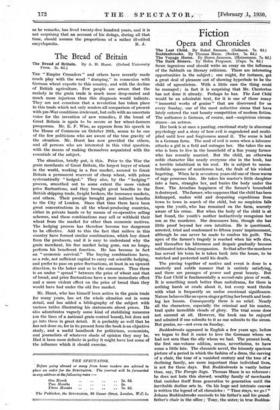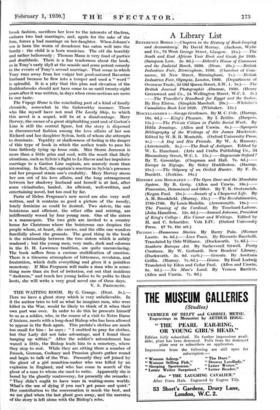Fiction
Opera and Chronicles
a great deal of pleasure out of showing hyperbole to be the child • of agnosticism. With a little care the thing could be managed ; in fact it is surprising that Mr. Chesterton has not done it already. Perhaps he has. The Lost Child would be an admirable text, for it is one of those many " immortal works of genius " that are discovered for us every Sunday, one of the most seductive sirens that have lately entered the vast beauty competition of modern fiction.
The authoress is German, of course, and—suspicious circum- stance—an actress.
Her book is at once a panting, emotional study in abnormal psychology and a story of bow evil is engendered and multi- plied until love and forgiveness annul it. The scene is laid in a German farm. The seed of evil is sown when a labourer attacks a girl in a field and outrages her. She takes the son who is born to live in the household of a fine young farmer who has recently married. But the child, an otherwise noble character like nearly everyone else in the book, has a terrible inhabitant in his soul. He is subject to uncon- trollable spasms of murderous lust, the fruit of his violent begetting. When he is seventeen years old one of these waves of rage possesses him. He takes his master's little daughter into a barn, strangles her, and buries the body under the floor. The Arcadian happiness of the farmer's household is destroyed. The farmer, who supposes that the child has been kidnapped, makes- wild and despairing expeditions from town to town in search of the child, but no suspicion falls upon the youth, who has remained on the farm, scarcely aware of his crime. But when the body of the child is at last found, the youth's mother instinctively recognizes her son as the murderer. She denounces him, though she has little proof beyond her own intuition. He is questioned, arrested, tried and condemned to fifteen years' imprisonment, although he can never be made to confess his guilt. The apex of the farmer's tragedy is reached when his wife dies, and thereafter his bitterness and despair gradually become sublimated into a final compassion. So that after the murderer has served his term he is taken back into the house, to be watched and protected until his death.
The piecing together of motive and event is done in a masterly and subtle manner that is entirely satisfying, and there are passages of power and great beauty. But The Lost Child is fundamentally a second-rate piece of work.
It is something much better than melodrama, for there is nothing harsh or crude about it, but every word throbs with what is frequently an undue emotional significance.
Nature behaves like an opera singer getting her breath and beat- ing her, bosom. Consequently there is no relief. Nearly all the characters, especially the criminal and his master, trail quite incredible clouds of glory. The trial scene does
not succeed at all. However, the book can be enjoyed and admired if one submits to it as one submits to the sirens. But genius, no—not even on Sunday.
Buddenbrooks appeared in English a few years ago, before we began to find it easier to love the Germans whom we had not seen than the ally whom we had. The present book, the first one-volume edition, seems, nevertheless, to have come a little late. The chronicle novel, the leisurely spacious picture of a period in which the fashion of a dress, the carving of a chair, the tone of a vanished century and the tree of a declining family, are more important than individual lives, is not for these days. But Buddenbrooks is vastly better than, say, The Forsyte Saga. Thomas Mann is no reformer : he does not hate this shrewd, wealthy family of merchants that enriches itself from generation to generation until the inevitable decline sets in. On his huge and intricate canvas is written the legend of all chronicles : " Time stays, we go " Johann Buddenbrooks succeeds to his father's and his grand- father's chair in the office ; Tony, the sister,• in true Budden- brook fashion, sacrifices her love to the interests of the firm, endures two bad marriages, and, again for the sake of the firm, forces a bad marriage on her daughter. When Johann's on is born the worm of decadence has eaten well into the family : the child is a born musician. The old die horribly and rather ludicrously : Thomas Mann is very fond of parties and deathbeds. There is a fine tenderness about the book, as in Tony's early idyll at the seaside and some potent comedy in the events of Tony's second marriage. That scene in which Tony runs away from her vulgar but good-natured Bavarian husband because he flew into a temper and used a " word " is splendid. It is a pity that this plan and elevation of the Buddenbrooks should not have come to us until twenty-eight years after it was written, in days when cross-sections are more to our taste.- The Voyage Home is the concluding part of a kind of family chronicle, somewhat in the Galsworthy. manner. Those who like myself have not read The Lovely Ship, to which this novel is a sequel, will be at a disadvantage. Mary Hervey, the owner of a great shipbuilding yard and of Garton's Line is still the central figure, but the story is dispersed in disconnected fashion among the love affairs of her son Richard and her daughter Sylvia, both of whom she attempts to dominate. Tepidity or shallowness of feeling is the danger of this type of book in which the author tends to pass his time listlessly tying up loose ends. Miss Storm Jameson is more than a little grim and cool, with the result that likely situations, such as Sylvia's flight to Le Havre and her impulsive marriage to a Garton Line captain, are scarcely more than interesting. -In fact, the captain's reaction to Sylvia's presence and her proposal strain one's credulity. Mary Hervey steers her son out of his love affairs, and the long estrangement between her shadowy husband and herself is at last, after some vicissitudes, healed. An efficient, well-written, and entertaining novel, but too cool by far.
Parts of Helen Ferguson's new novel are also very well written, and it contains as good a picture of the moody, lonely feminine as could be desired. Two sisters, the one boisterous and efficient, the other elfin and retiring, are indifferently wooed by four young men. One of the sisters is a mannequin. The two girls are invited to a country house for Christmas where the boisterous one despises the people whom, at heart, she envies, and the elfin one wanders fancifully about the grounds. The good thing in the book is the relationship between the two sisters which is subtly rendered ; but the young men, very male, dark and odorous in the D. H. Lawrence tradition, are quite unconvincing. The book suffers from a curious stultification of emotion. There is a tiresome atmosphere of bitterness, revulsion, and frustration, which dulls everything and gives it a pointless monotony. If Miss Ferguson will make a man who is some- thing more than six feet of irritation, cut out that insidious " darkness," and teach her young ladies to be polite to their hosts, she will write a very good novel one of these days.
V. S. PRITCHETT.







































 Previous page
Previous page